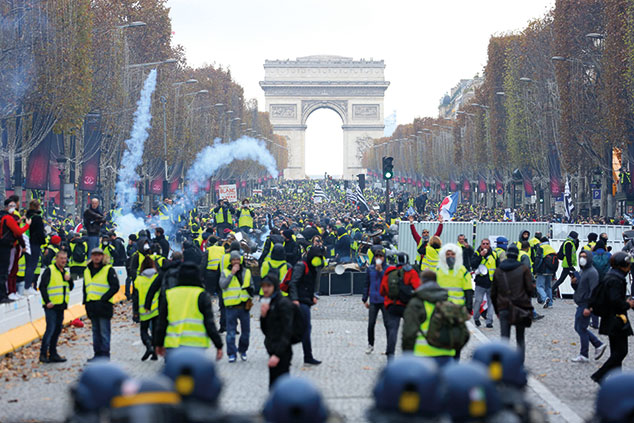
The protest movement known as the gilets jaunes (yellow jackets) “that has disrupted French life and sparked the worst rioting for decades in the heart of Paris” has forced President Emmanuel Macron to halt plans to raise petrol and diesel prices, says Charles Bremner in The Times. The government will also suspend imminent rises in domestic electricity and gas prices and cut the cost of MOT tests for vehicles. These moves “represent Macron’s first policy surrender, 18 months after he won office saying that he would never yield to street protesters as all his recent predecessors had done”.
Macron’s concession might not be enough, as these were no ordinary protests, says John Lichfield in The Guardian. The centre of Paris had not seen violence on this scale since the student and worker rebellion of May 1968. Despite claims the protests had been hijacked by extremists, the “great majority” of protestors seemed to be “men and some women in their 30s and 40s from suffering rural towns in northern or western France”. These people represented those suffering “genuine economic and social distress in a peripheral and middle France” who say that they are “despised and fiscally exploited by the country’s thriving cities”.
Is Macron finished?
The protests follow missteps “that have left Macron’s popularity ratings lower after 18 months in office than any recent predecessors”, says the Financial Times. While pro-business measures, such as a flat tax on dividends, “made sense as a way of encouraging investment”, they “fuelled perceptions that the president is out of touch”.
If Macron wants to break the cycle “where often vital reforms are derailed by industrial action or street protests”, he needs to “rethink his communication strategy, his tone and language, to convince the broader electorate he is not merely a president for the rich”. If he doesn’t, “his whole project will be in danger”.
Don’t hold your breath, says Jonathan Miller in The Spectator. It’s hard to see how the “tone deaf” Macron can recover from this, since he “has not a trace of humility in his personality”. His detachment from the popular mood “is in a class with Marie Antoinette”. While such presidential aloofness “may have worked for General de Gaulle, he can neither carry it off nor can such a personality survive an onslaught by social media”. Instead of “inspiring the country with the grand project of national renewal, he has united the country against himself” with the result that “power has drained from the presidency to the streets”.
Could it happen here?
Some might say this could never happen in Britain, but I wouldn’t be so sure, says Therese Raphael on Bloomberg. Offshoots of the French protests have already turned up in the Netherlands, Belgium and Italy. There “is a lot of anger in the UK” and memories of the 2011 London riots are still fresh. The EU may have provided a useful “scapegoat”, but the Brexit withdrawal process means that the problems created by “years of austerity, low productivity growth, declining or stagnating wages and rising inequality” can “barely get a government hearing”. That’s a potentially explosive mix.